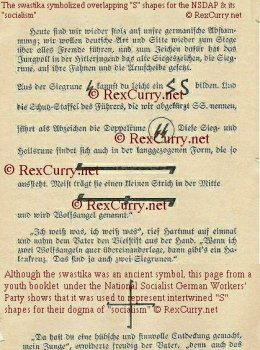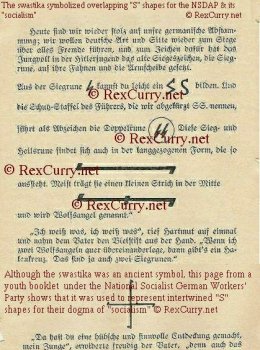"Stop the Pledge of Allegiance"
2007-03-07 07:50:52 UTC
Swastika pictures at Loading Image...
(below) and at Loading Image...
from the historian Dr. Rex Curry are part of a historic discovery of a 1935
Youth's booklet from the National
Socialist German Workers' Party. It shows that the Hakenkreuz-swastika was
used to symbolize intertwined S-shapes for the Party.
http://rexcurry.net/book1a1contents-swastika.html
The entire book was uncovered by the historian Dr. Rex Curry's research and
it is the
only example known to exist. Although the book is in its original
German language, the illustrations clearly reflect the text which
explains that common symbols under the National Socialist German
Workers' Party often used the "S" shape, including the side-by-side use
in the "SS" Divison and the overlapping use in the Hakenkreuz.
http://rexcurry.net/bookchapter4a1a3.html
Although the swastika was an ancient symbol, the booklet serves as
important primary source evidence that the Hakenkreuz was used also to
represent intertwined "sieg" runes for the victory of socialism under
the horrid National Socialist German Workers' Party.
The word "swastika" as used in English for the symbol of the National
Socialist German Workers' Party was a misleading translation of
"hakenkreuze." The obvious translation from the original word "hakenkreuz"
should have been "hooked cross." http://rexcurry.net/swastikanews.html
"Swastika" translators might have wanted the monstrous National Socialist
German Workers' Party to stain a foreign symbol rather than their own.
"Hakenkreuz" is a reference to a cross.
http://rexcurry.net/swastikacross.html
The "cross" analogy might have been a reminder that in ancient times it was
for torture and execution. The Nazi Hakenkreuz was used in the persecution
of people for various reasons, including religious
differences. It came to represent the socialist sins of the Nazis.
The horrid National Socialist German Workers' Party used the word
"hakenkreuze" and not the word "swastika."
The deceptive translation led to the
"swastika myth" that the National Socialist German Workers' Party adopted
the symbol because it was an ancient symbol meaning "good luck." That myth
has been debunked
http://rexcurry.net/book1a1contents-swastika.html
The swastika myth covers-up the fact that, for the National Socialist
German Workers' Party, the hakenkreuze represented overlapping "S"
shapes symbolizing "socialism." Eschew the word "swastika" in any
discussion of the The monstrous National Socialist German Workers'
Party.
By the way, whenever this topic arises, it is funny to see how many
responses simply write that the swastika was an ancient symbol. Usually
someone will post that "the swastika was an ancient symbol" followed by
cut and paste. Everyone is aware that the swastika was an ancient
symbol. People who reply with such a comment only show that they completely
miss the point.
(below) and at Loading Image...
from the historian Dr. Rex Curry are part of a historic discovery of a 1935
Youth's booklet from the National
Socialist German Workers' Party. It shows that the Hakenkreuz-swastika was
used to symbolize intertwined S-shapes for the Party.
http://rexcurry.net/book1a1contents-swastika.html
The entire book was uncovered by the historian Dr. Rex Curry's research and
it is the
only example known to exist. Although the book is in its original
German language, the illustrations clearly reflect the text which
explains that common symbols under the National Socialist German
Workers' Party often used the "S" shape, including the side-by-side use
in the "SS" Divison and the overlapping use in the Hakenkreuz.
http://rexcurry.net/bookchapter4a1a3.html
Although the swastika was an ancient symbol, the booklet serves as
important primary source evidence that the Hakenkreuz was used also to
represent intertwined "sieg" runes for the victory of socialism under
the horrid National Socialist German Workers' Party.
The word "swastika" as used in English for the symbol of the National
Socialist German Workers' Party was a misleading translation of
"hakenkreuze." The obvious translation from the original word "hakenkreuz"
should have been "hooked cross." http://rexcurry.net/swastikanews.html
"Swastika" translators might have wanted the monstrous National Socialist
German Workers' Party to stain a foreign symbol rather than their own.
"Hakenkreuz" is a reference to a cross.
http://rexcurry.net/swastikacross.html
The "cross" analogy might have been a reminder that in ancient times it was
for torture and execution. The Nazi Hakenkreuz was used in the persecution
of people for various reasons, including religious
differences. It came to represent the socialist sins of the Nazis.
The horrid National Socialist German Workers' Party used the word
"hakenkreuze" and not the word "swastika."
The deceptive translation led to the
"swastika myth" that the National Socialist German Workers' Party adopted
the symbol because it was an ancient symbol meaning "good luck." That myth
has been debunked
http://rexcurry.net/book1a1contents-swastika.html
The swastika myth covers-up the fact that, for the National Socialist
German Workers' Party, the hakenkreuze represented overlapping "S"
shapes symbolizing "socialism." Eschew the word "swastika" in any
discussion of the The monstrous National Socialist German Workers'
Party.
By the way, whenever this topic arises, it is funny to see how many
responses simply write that the swastika was an ancient symbol. Usually
someone will post that "the swastika was an ancient symbol" followed by
cut and paste. Everyone is aware that the swastika was an ancient
symbol. People who reply with such a comment only show that they completely
miss the point.